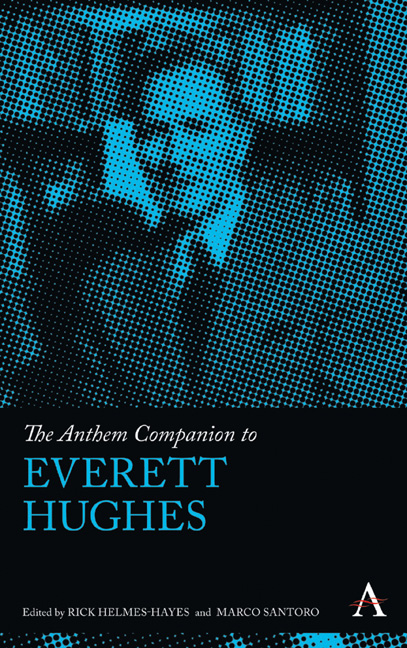Book contents
- Frontmatter
- CONTENTS
- List of Illustrations
- Foreword Everett C. Hughes, Great Teacher
- Insight through Craftsmanship: The Sociological Legacy of Everett Hughes
- Chapter One Everett Hughes and the Chicago Tradition
- Chapter Two Studying “Going Concerns”: Everett C. Hughes on Method
- Chapter Three The Natural History of Everett Cherrington Hughes: A Master of Fieldwork
- Chapter Four Everett C. Hughes: A Key Figure of the Canadian Chicago School Diaspora
- Chapter Five Everett Hughes: Notes from an Apprentice
- Chapter Six An American in Frankfurt: Everett C. Hughes's Unpublished Book on Germans after the End of the Nazi Regime
- Chapter Seven The Origins and Evolution of Everett Hughes's Concept: ‘Master Status’
- Chapter Eight Discovering the Secret of Excellence: Everett Hughes as a Source of Inspiration in Researching Creative Careers
- Chapter Nine Everett Hughes on Race: Wedded to an Antiquated Paradigm
- Notes on Contributors
- Index of Names
- Index of Subjects
Insight through Craftsmanship: The Sociological Legacy of Everett Hughes
Published online by Cambridge University Press: 17 June 2017
- Frontmatter
- CONTENTS
- List of Illustrations
- Foreword Everett C. Hughes, Great Teacher
- Insight through Craftsmanship: The Sociological Legacy of Everett Hughes
- Chapter One Everett Hughes and the Chicago Tradition
- Chapter Two Studying “Going Concerns”: Everett C. Hughes on Method
- Chapter Three The Natural History of Everett Cherrington Hughes: A Master of Fieldwork
- Chapter Four Everett C. Hughes: A Key Figure of the Canadian Chicago School Diaspora
- Chapter Five Everett Hughes: Notes from an Apprentice
- Chapter Six An American in Frankfurt: Everett C. Hughes's Unpublished Book on Germans after the End of the Nazi Regime
- Chapter Seven The Origins and Evolution of Everett Hughes's Concept: ‘Master Status’
- Chapter Eight Discovering the Secret of Excellence: Everett Hughes as a Source of Inspiration in Researching Creative Careers
- Chapter Nine Everett Hughes on Race: Wedded to an Antiquated Paradigm
- Notes on Contributors
- Index of Names
- Index of Subjects
Summary
He’ never been given, I think, the credit he deserves.
(Erving Goffman on Everett Hughes [Verhoeven 1993: 336])When one reads sociology textbooks or accounts of major trends and figures in the historical development of the discipline, there is a litany of names from the nineteenth and twentieth centuries – Karl Marx, Max Weber, Émile Durkheim, Robert Park, George Herbert Mead, Talcott Parsons, Erving Goffman – that appears over and over again. These figures are universally acknowledged as belonging to a list of scholars who built the theoretical foundations of the discipline. More recently, figures such as Jürgen Habermas, Anthony Giddens, Dorothy Smith, Michel Foucault and Pierre Bourdieu have been added to that list.
This Anthem Companions to Sociology series is noteworthy from our perspective because it is the first time that Everett Cherrington Hughes (1897–1983) has been accorded a place in the pantheon. Hughes is largely unknown, or known by name only, to most practicing sociologists. He is rarely listed among ‘the masters’ by social theorists or historians of social thought and is usually missing from dictionaries, encyclopaedias and guides to the discipline. Nonetheless, it is our view that Hughes belongs on these lists. And there is a growing community of scholars spread across North America and Europe – France and Italy, in particular – who regards him as among the most innovative and original sociologists of the twentieth century. Moreover, he was – and is – more influential than would appear to be the case. The source of his impact? His conceptual/ theoretical influence on other high-profile scholars who were his students and colleagues (e.g., Howard S. Becker, David Riesman, Anselm Strauss, Eliot Freidson and Goffman) and his role in developing, nurturing and teaching the value of fieldwork.
Hughes’ contribution to North American sociology in the middle decades of the twentieth century is indisputable. Hughes, along with his wife, Helen MacGill Hughes, did his PhD at Chicago. While there, he became one of Park’ favourite students (Riesman 1983: 480). After an interval at McGill University in Montreal (1927–38), he returned and became a prominent member of the Chicago department between 1938 and 1961. While there, he championed the teaching of fieldwork methods and, by so doing, became a crucial figure in the ‘second Chicago School’ (Fine 1995).
- Type
- Chapter
- Information
- The Anthem Companion to Everett Hughes , pp. 1 - 38Publisher: Anthem PressPrint publication year: 2016

